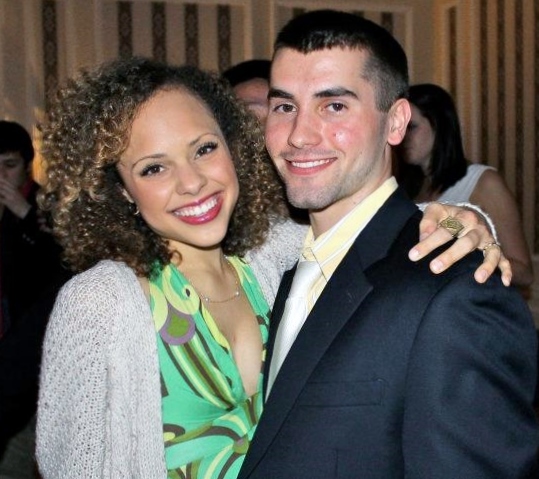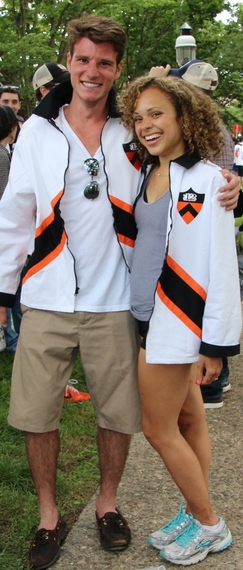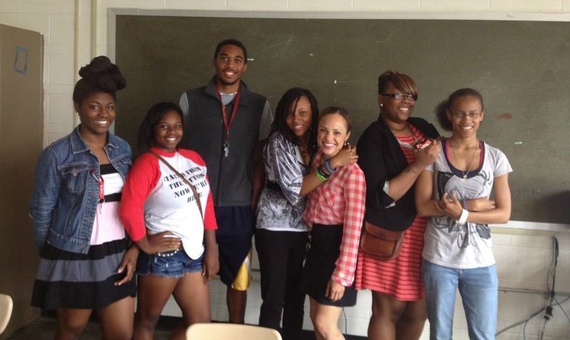The content of this post may be sensitive to some readers.
Once an Anorexic, Always an Anorexic
I entered sophomore year with this newfound resolve and the determination to truly fight my anorexic tendencies. Thankfully, I stumbled upon new resources along the way. The first came in the form of a companion. Joe and I met as freshmen, and my instant infatuation was deep, all too apparent, and frequently embarrassing. Thankfully, Joe brushed aside such awkward advances in due time (read: eight months), and we fell into five years of love, friendship, and support. In Joe, I finally found someone to spend time with, someone who would end my loneliness. In him, I found a friend who I was willing to bend my regimented life for and who would replace food as my day's focus.
Most importantly, Joe taught me what I couldn't do for lack of calories. His focus was tremendous and unlike anyone's I had seen before. He would study for hours without breaking concentration, never lifting his eyes from the page, never stopping for social media, and always disappointed by his "too slow" pace. I, on the other hand, was constantly distracted. 
I struggled to read a single page without my mind wandering or my pen summing caloric consumption at the top of the page. I read too slowly, retained too little, and, at the very least, doubled my study time for such inefficiencies. Yet, I wanted to be like Joe. I wanted to excel like him; I wanted to rise to the top of my class as he had; and, most importantly, I wanted to be an academic leader in both my eyes and those of my peers. For his example, I saw that anorexia had put a dummy goal before me and distracted me from achieving my real dreams. His presence was a persistent reminder to fight against engrained habits and to channel controlling tendencies into my work and away from my body.
The second form of help came two years later in a pair of running shoes. They weren't pretty --in fact, turquoise and silver in color. But they were always on my feet. I first slipped them on in an effort to overcome the boredom of the elliptical and in search of a new challenge. In fact, running had been a long-held goal of mine, but one that had a remained elusive for my poor health. But now, things were different now. I had moved beyond a state of starvation and far enough away from caloric control that I was physically ready to conquer some miles. Now, I was ready to don a sports bra and make friends with the treadmill.
 What I didn't expect, though, was that running would forever alter my relationship with my body. As I ran harder and longer and pushed myself to greater goals, I developed a new identity. I saw myself as a runner, as an athlete. I wasn't running (primarily) to stay thin but to hit new PRs or train for an upcoming race. Now, the thought of burning away last night's ice cream or this afternoon's salad wasn't my motivation; the feeling of strength, of powerful legs carrying me through mile after mile, was.
What I didn't expect, though, was that running would forever alter my relationship with my body. As I ran harder and longer and pushed myself to greater goals, I developed a new identity. I saw myself as a runner, as an athlete. I wasn't running (primarily) to stay thin but to hit new PRs or train for an upcoming race. Now, the thought of burning away last night's ice cream or this afternoon's salad wasn't my motivation; the feeling of strength, of powerful legs carrying me through mile after mile, was.
Even more impressive, though, was my shifting perception of food. Training leaves you hungry -- real hungry. I'm talking ravenous, bottomless pit, stash two Power Bars in my purse kind of hungry. As an anorexic, I would have suppressed those feelings, totaled my calories, and decided to drink an iced coffee or two. But as a recovering anorexic, my thoughts were different. While they would begin at suppression, they would change course and remind me that food was my fuel. Without it, my running days would come to an end and my months of hard work would have been for not. And with that I'd pick up my fork (or spoon, or hands) and eat anxiety free. Ironically, the one activity that is so intertwined with eating disorders, mine included, was the key to my psychological freedom.
The third and final source of help came in the form of 108 high school seniors. They were my students, and I was their teacher, friend, mentor, and at times, surrogate parent. They attended a school where order and safety was replaced by cursing and fighting, where books were banned because "these students" couldn't handle them, and an inept leadership team cared less about student learning and more about saving their own behinds. At the tender age of 18, these students had experienced greater hardships than many people ever do. They were familiar with death and poverty; many knew hunger and homelessness; and the majority was fighting to finish high school and be the first in their family to do so.
This was the reality I now faced. I had traded stacks of books and intellectual development for lives. Frankly, I didn't have time for anorexia. I was fighting too hard to stay afloat and make heads and tails of this teaching thing to think so selfishly. Having already made great strides in my recovery, I was at a place where I could see this. I could accept that my dual goals of academic and bodily control were entirely self-concerned. I could see that they were juvenile and a result of limited experiences and a privileged life. But at 22, this abruptly changed, and I was forced to reconstruct my life. Consequently, I gained weight. And you know what? It wasn't that bad. A chest and hips aren't the worst thing in the world. Either is looking like a woman instead of a prepubescent teen.
 Having said all this, I don't want to paint a false picture. Recovery is gradual. It is far from linear and never steady: at times it plunges forward, at others it stalls, and at others still, it pulls itself into reverse, leaving an uprooted life in its wake. But what is different about true recovery is that I stand at the helm. Not my father. Not my therapist. Not the disease. Me. I am recovery's impetus; I am its director. It is only for my strength of will -- ironically, that same will that enabled three years of starvation -- that I have brought anorexia to its knees.
Having said all this, I don't want to paint a false picture. Recovery is gradual. It is far from linear and never steady: at times it plunges forward, at others it stalls, and at others still, it pulls itself into reverse, leaving an uprooted life in its wake. But what is different about true recovery is that I stand at the helm. Not my father. Not my therapist. Not the disease. Me. I am recovery's impetus; I am its director. It is only for my strength of will -- ironically, that same will that enabled three years of starvation -- that I have brought anorexia to its knees.
Yet, anorexia will always live dormant within me. It waits to awake and entangle me in its strangling embrace. It is my responsibility to keep it at bay. I cannot give it the sustenance it longs for--restrictive eating, caloric counting, and self-loathing; for once I do, it is a steep slide back into the depths of sickness--and that is one place I never want to return.
Anorexia is a life-long battle, and I know that I will always be in recovery. But I also know that I have achieved an incredible feat in beating this horrendous disease. And for that, I have finally gained happiness.
Read Part One, Part Two, Part Three, Part Four, and Part Five.
A Tale of a Recovering Anorexic is a six-part series rooted in honesty and our communal struggle with body image. If you'd like to connect (and I would love to!), I can be contacted here.